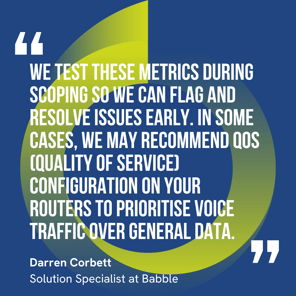Is Your UCaaS Quote Right for Your Business? Here’s How to Know
You’re considering a move to a cloud phone system. Maybe you’ve already started speaking to providers, or you’re reviewing a proposal right now. On the surface, the numbers might look reasonable, but how do you know if the solution being quoted is truly the right fit for your business?
Having worked with countless businesses moving from legacy PBX systems to leading UCaaS solutions like Gamma Horizon and Evolve Anywhere, I’ve seen these situations play out too often. Quotes that look affordable upfront but miss critical functionality. Others that bundle in every possible add-on, pushing up costs for features you may never use.
In this guide, I’ll explain what drives UCaaS costs, how we scope solutions to avoid common pitfalls, and why your proposal from Babble is designed to give you confidence that it’s the right fit.
_
What This Blog Covers:
Why UCaaS Quotes Can Vary So Much
UCaaS pricing isn’t one-size-fits-all. The base licence cost for platforms like Gamma Horizon or Evolve Anywhere typically ranges between £10 and £23 per user per month. Depending on the vendor, a base licence typically buys you:
- Call handling and voicemail
- Internal extensions and direct dial-in (DDI) numbers
- A user-friendly interface
- Access to apps like Cisco Webex for softphone use
This level is ideal for small teams with straightforward needs.
But as you add functionality, many businesses consider essential features such as call recording, analytics, CRM or Teams integration, and PCI-compliant payment solutions. Adding these features can increase the per-user cost by £10 to £20, depending on the licence type and the level of advanced functionality required.
For example, a 10-person estate agency with basic requirements might pay around £12 per user/month for call handling, voicemail, and desk phones. While a 50-person financial services firm needing call recording, analytics dashboards, and full Teams integration could see per-user costs closer to £35 per month because of the add-ons to the base license, plus a one-time fee for infrastructure upgrades like Power over Ethernet (PoE) switches or dedicated broadband lines.
A cloud phone system also depends on having the right hardware and infrastructure in place to deliver clear, reliable calls. That includes PoE switches to supply both power and data to IP phones, sufficient data ports for every device, and cabling (Cat5e or higher) that can support VoIP traffic without degradation. Broadband is equally important, smaller teams may use existing connections if they are fast enough, with approximately 2Mbps upload/download available for voice, but for larger businesses or those with heavy data use, we often recommend dedicated voice lines or VLANs to keep call quality consistent. During scoping, we check all of this, so any necessary upgrades are factored into your proposal upfront.
Why Infrastructure Matters
A cloud phone system requires a strong and reliable network foundation. That's why during our scoping process, we don’t just ask how many users you have — we dig into how your network will handle voice traffic in real-world conditions. Here’s what we assess:
1. Broadband Capacity
Voice calls over UCaaS don’t require massive bandwidth, but they do need dedicated and consistent capacity. As a general rule, allow at least 100kbps per concurrent call, with extra overhead for other network activity.
- For a 10-user team, reserving 2Mbps upload/download for voice traffic alone is usually sufficient.
- A 50-user business expecting up to 25 simultaneous calls should reserve 2.5–3Mbps upload/download.
- Larger organisations with 200+ users may require dedicated leased lines with at least 10–20Mbps reserved for VoIP traffic, depending on call volumes and data usage.
For smaller businesses on shared broadband lines, we often recommend separating voice and data traffic (via a dedicated VLAN or even a second line) to maintain call quality during periods of heavy data use.
2. Latency and Jitter
Good call quality isn’t just about speed — it’s about stability.
- Latency (the delay between speaking and being heard) should ideally be below 150ms. Higher latency can result in awkward delays during conversations.
- Jitter (variability in packet delivery times) should stay below 30ms. Excessive jitter leads to choppy or robotic-sounding audio.
We test these metrics during scoping so we can flag and resolve issues early. In some cases, we may recommend QoS (Quality of Service) configuration on your routers to prioritise voice traffic over general data.
3. Network Setup
Your internal network also plays a key role in supporting VoIP:
- PoE (Power over Ethernet) switches: These deliver both power and data to IP phones, eliminating the need for separate power adapters.
- Sufficient data ports: Each handset or VoIP device needs a dedicated port, and we check your switch capacity to ensure you won’t run out of connections.
- Cabling standards: We confirm that your cabling (Cat5e or higher) supports VoIP traffic reliably.
If your current setup falls short, we’ll build any necessary upgrades into your proposal so there are no surprises later.

A fit-for-purpose solution includes the software capabilities your team relies on every day: call recording for compliance and training, advanced reporting dashboards for visibility into performance, and CRM integrations to streamline workflows and reduce admin time. For businesses using Microsoft Teams as their collaboration hub, full UCaaS integration brings calls, chats, and meetings into one seamless platform. Mobile apps enable staff to stay connected wherever they’re working, while features like voicemail-to-email and presence indicators help teams work smarter, not harder.
When a Quote Is Too Basic
It’s tempting to go with a quote that seems affordable and covers “the basics.” But in our experience, these can leave you with missing functionality that your teams rely on every day, such as:
- Compliant Call Recording for regulated industries or staff training.
- Call Analytics for tracking response times and missed calls.
- CRM Integration to save time and give staff instant customer context.
- PCI-Compliant Payments for secure card handling over the phone.
- Support for Remote and Multi-Site Teams to keep everyone connected seamlessly.
These gaps often come from a rushed scoping process. At Babble, we take the time to ask the right questions and, whenever possible, conduct a site visit. That way, your solution is scoped properly upfront — no hidden costs, no functionality gaps.
When a Quote Is Over-Engineered
At the other end of the scale, some quotes include every premium feature available. While it can feel like a “safer” option, over-spec’d systems often add unnecessary cost.
Take Microsoft Teams integration: for businesses already using Teams daily, full integration is a smart move for combining calls, chats, and meetings into one familiar platform. Yes, there’s an additional Microsoft licence cost (around £5–£7 per user), but for many companies, the productivity gains far outweigh it.
For smaller teams or those not yet using Teams heavily, a lighter plug-in might be a better starting point, with the option to scale later. The same principle applies to advanced analytics: not every user needs access to reporting dashboards — often it’s only managers or team leaders.
At Babble, we focus on what your team actually needs now and make sure your system can flex as your business grows.
The Questions We Ask to Get Your Quote Right
Our quoting process is designed to give you confidence. Here are some of the key questions we cover upfront to ensure your proposal is tailored to your business: 
- Will your users need UK, international, and 08 call packages? So we can include the right calling plan from day one.
- Do you need number porting, and how many numbers are involved? Porting costs can range from £15–£150 depending on your setup.
- Is on-site installation required, or will remote provisioning work? We’ll recommend the best rollout approach.
- Has your network been tested for VoIP readiness? We assess broadband speed, latency, and cabling to ensure your system performs as expected.
This thorough scoping process means your proposal reflects your actual requirements, with no hidden costs or surprises later.
As part of our scoping process, we’ll also ask if you need any additional tools or integrations to get the most out of your UCaaS system. These can enhance functionality and ensure your setup fully supports the way your team works. For example:
- Akixi provides real-time call reporting and wallboards that give you full visibility into your telephony activity. With live stats on active calls, waiting times, and agent performance, it helps businesses track KPIs and improve customer service. It’s especially useful for teams and contact centres that need actionable insights to optimise workflows.
- Dubber is a secure, cloud-based call recording solution. It allows businesses to record calls for compliance, training, or dispute resolution while meeting GDPR and PCI standards. With easy access to recordings and scalable storage, it’s ideal for industries where regulatory requirements demand reliable record-keeping.
- AI Studio allows you to create professional greetings, on-hold messages, and prompts using AI-generated voices as well as a vast music library. It’s ideal for businesses that want to maintain a polished caller experience while staying agile as their services or promotions evolve.
So What Does This Mean for You?
Your UCaaS quote isn’t just a price tag. It’s a blueprint for how your business will communicate, collaborate, and serve customers every day.
At Babble, we’ve helped hundreds of businesses move from PBX to the cloud successfully. By asking the right questions and checking your infrastructure upfront, we make sure the solution we recommend is one you can trust, built for your needs today, and ready to scale tomorrow.
If you have questions about your quote or want to walk through any part of it, just let us know. We’re here to make sure you feel 100% confident moving forward.
Subscribe by email
You May Also Like
These Related Stories

Are Your Phone Payments PCI Compliant? Here’s How to Know

Akixi Explained: Real-Time Insights for Smarter Call Management


